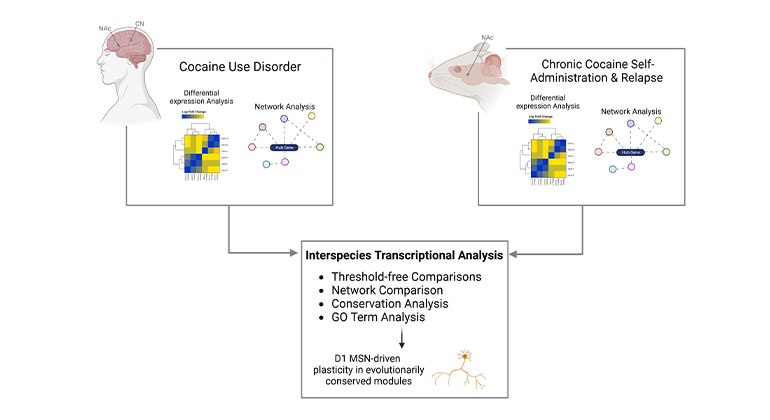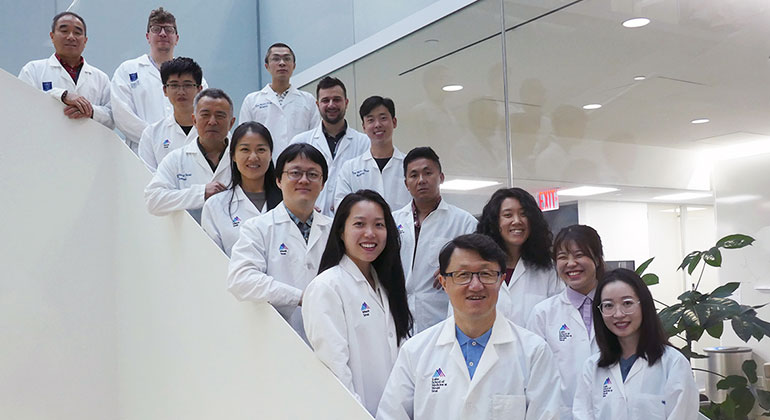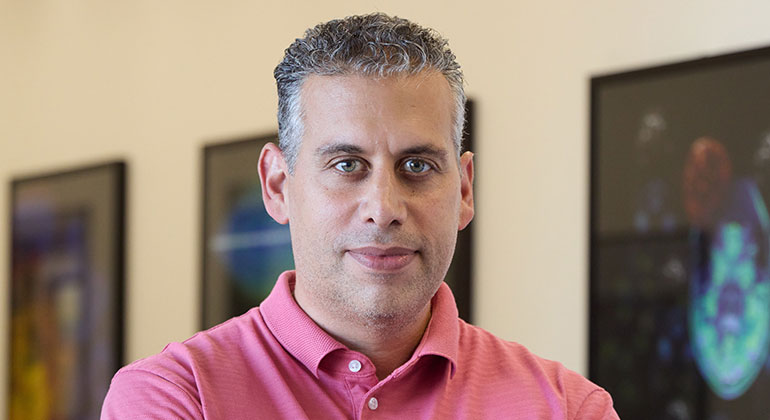Philanthropic Gift to Mount Sinai Establishes The Lipschultz Center for Cognitive Neuroscience
New center is dedicated to better understanding of the underlying mechanisms, diagnosis, and treatment of disorders of cognitive function in humans
A new Mount Sinai research center will focus on understanding the neural mechanisms of higher cognitive function, and applying this knowledge to the diagnosis and treatment of disorders of cognitive function in humans. The Lipschultz Center for Cognitive Neuroscience, the newest center within the Nash Family Department of Neuroscience and The Friedman Brain Institute at the Icahn School of Medicine at Mount Sinai, was established through a grant from Marc and Jennifer Lipschultz, whose philanthropic generosity has supported many important initiatives within the Mount Sinai Health System over the past 16 years.
Disruptions early in the development of the human brain set the stage for dysfunction later in life, so studying the circuit mechanisms of cognitive function in the context of development is vital to understanding how diseases of thought and cognition occur.
“The enormity of the impact of diseases of cognition, including Alzheimer’s disease and Parkinson’s disease, cannot be overstated,” says Eric J. Nestler, MD, PhD, Nash Family Professor of Neuroscience, Director of The Friedman Brain Institute, and Dean for Academic and Scientific Affairs at the Icahn School of Medicine at Mount Sinai. “Through their commitment and generosity, the Lipschultz family is enabling us to make the fundamental advances in cognitive brain research that have been needed for decades.”
The Lipschultz Center for Cognitive Neuroscience will be led by Mark Baxter, PhD, Professor of Neuroscience; Anesthesiology, Perioperative and Pain Medicine; and Geriatrics and Palliative Medicine at the Icahn School of Medicine at Mount Sinai and an international leader in cognitive neuroscience. The center will focus on understanding the neural circuit mechanisms of higher cognitive function, and applying this knowledge to the diagnosis and treatment of disorders of cognitive function in humans.
“Motivation for the research that’s being conducted in our new center comes from the intersection of a number of streams of investigation in the field of neuroscience,” says Dr. Baxter. “A recent explosion of technological advances allows for monitoring and manipulation of the activity of brain cells at previously unimaginable scales, enabling us to discern the role of very precisely defined neural circuits in behavior in ways that were not possible even five years ago. Using the most advanced neuroanatomical, neurobiological, and neuroimaging techniques in a variety of experimental models, our research teams will illuminate the circuit mechanisms of cognitive function and disease from early development through later life, facilitating the development of new therapeutic strategies for disorders in which cognitive deficits are a prominent feature.”
The origins of many psychiatric and neurological disorders in humans are found early in development, so uncovering the circuit mechanisms of cognitive function in the context of development is important to understanding diseases of thought and cognition. At the other end of the spectrum, neurodegenerative diseases are characterized by extremely prolonged “prodromal” phases, where disease process is active for up to several decades while behavioral and cognitive symptoms are either subtle or nonexistent, pointing to the extraordinary plasticity and resilience of the brain as it maintains function in the face of compromised structure. The Lipschultz Center is equipped and committed to uncovering the fundamental elements of cognitive disease processes and to developing interventions that are effective in heading off damage to neural circuits before it becomes entrenched.
To accomplish these goals, research in the Center spans a wide range of experimental models, including mice, rats, nonhuman primates, and humans, at all phases of the lifespan from early development to advanced aging. Projects include fundamental research on circuit mechanisms of behavior, the study of neural circuits in animal models of neurological and neurodegenerative disease, and the characterization of mechanisms of dysfunction in humans with impaired cognition as a consequence of disease.
“The Lipschultz Center for Cognitive Neuroscience, under the leadership of Dr. Baxter, brings together some of the most talented cognitive neuroscientists in the United States,” says Paul Kenny, PhD, Ward-Coleman Professor and Chair of the Nash Family Department of Neuroscience and Director of the Drug Discovery Institute at Mount Sinai. “We are very grateful to Mr. and Mrs. Lipschultz for their generous support of our exciting new Lipschultz Center and are certain that it will serve as a major catalyst for new discoveries in some of the most challenging and complex areas of neuroscience research.”
To further enhance and expedite discovery, the Lipschultz Center collaborates closely with several other Centers recently established within the Nash Family Department of Neuroscience and The Friedman Brain Institute, including the Loeb Center for Alzheimer’s Disease led by Alison M. Goate, DPhil, the Center for Affective Neuroscience led by Scott J. Russo, PhD, the Center for Neurotechnology and Behavior led by Paul Slesinger, PhD, and the Nash Family Center for Advanced Circuit Therapeutics led by Helen Mayberg, MD.
About the Mount Sinai Health System
Mount Sinai Health System is one of the largest academic medical systems in the New York metro area, with 48,000 employees working across seven hospitals, more than 400 outpatient practices, more than 600 research and clinical labs, a school of nursing, and a leading school of medicine and graduate education. Mount Sinai advances health for all people, everywhere, by taking on the most complex health care challenges of our time—discovering and applying new scientific learning and knowledge; developing safer, more effective treatments; educating the next generation of medical leaders and innovators; and supporting local communities by delivering high-quality care to all who need it.
Through the integration of its hospitals, labs, and schools, Mount Sinai offers comprehensive health care solutions from birth through geriatrics, leveraging innovative approaches such as artificial intelligence and informatics while keeping patients’ medical and emotional needs at the center of all treatment. The Health System includes approximately 9,000 primary and specialty care physicians and 11 free-standing joint-venture centers throughout the five boroughs of New York City, Westchester, Long Island, and Florida. Hospitals within the System are consistently ranked by Newsweek’s® “The World’s Best Smart Hospitals, Best in State Hospitals, World Best Hospitals and Best Specialty Hospitals” and by U.S. News & World Report's® “Best Hospitals” and “Best Children’s Hospitals.” The Mount Sinai Hospital is on the U.S. News & World Report® “Best Hospitals” Honor Roll for 2024-2025.
For more information, visit https://www.mountsinai.org or find Mount Sinai on Facebook, Instagram, LinkedIn, X, and YouTube.

Mount Sinai Neurobiologist Selected as a Howard Hughes Medical Institute Investigator
Sep 23, 2021 View All Press Releases




